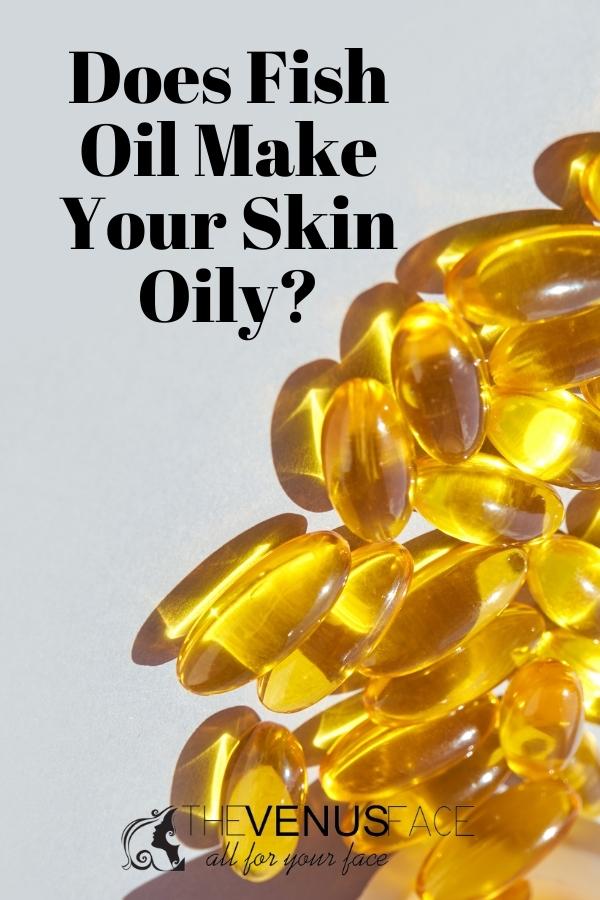Does fish oil make your skin oily? Learn more in this post.
People with oily skin often have a difficult time finding skincare products that will help to control the oiliness. Oily skin can be caused by a variety of factors, such as genetics, hormones, and lifestyle choices. While oily skin can be frustrating, there are a few things that you can do to help manage the oiliness.
To combat oily skin, people usually buy oil blotting sheets or some type of astringent. They may even use a specific face cleanser, toner, or exfoliant. As helpful as these items are, they can only do so much for you when it comes to oily skin. These are the basics that every skincare regimen should incorporate. Moreover, some people take their skincare regimen to the next level using essential oils or by incorporating fish oil supplements.
There are arguments about this, some say it makes it worse, some say it doesn’t make a difference.
So, does fish oil make your skin oily?

Can fish oil cause oily skin?
There isn’t any proof that fish oil can cause oily skin. Actually, there are many benefits of fish oil for the body, which include the fact that it boosts your immune system and promotes cardiovascular health. However, there are also some possible negative side effects of fish oil supplements.
Although research about this is limited, one study suggests that fish oil can actually help reduce the oil production in your skin by regulating the production of sebum thanks to omega-3 fatty acids. In other words, the study said that people who take fish oil supplements will have less facial shine from excess oil.
In a nutshell, there isn’t any evidence to prove that taking fish oil supplements can cause oily skin or worsen existing oily skin. So, if you’re looking for a healthy supplement to boost your immune system, consider taking fish oil.
Does omega-3 work for oily skin?
Yes, it does. Omega-3 fatty acids have an important part in maintaining hormone balance during stress. Omega-3 supplements, for example, have been discovered to lower cortisol, a stress hormone associated with sebum production.
Can omega 3 make skin oily?
No, it can’t. People misunderstand that omega 3 supplements make skin oily. Actually, it’s the other way round. It can help improve skin oil production, maintain balanced hydration, reduce breakouts, and minimize signs of aging after you take omega 3 supplements. Omega-3s can also help soften rough, scaly skin and have a soothing effect on irritation and dermatitis.
Fish oil benefits for skin
There are many benefits of fish oil when used topically or when ingested orally.
Hydrating
Fish oil is a good thing to put on your skin if it feels dry. Fish oil can help the skin not lose water. You can put it near your eyes or on rough patches of skin. It is also good to put on elbows and knees if they are dry. However, if you have oily skin, you should not put fish oil on your face.
Sunray protection
Omega-3 fatty acids eicosapentaenoic acid can help protect the skin from ultraviolet radiation damage. Please note that it cannot replace sunscreen, but it can help protect the skin from long-term damage from ultraviolet radiation from the sun. Consequently, a study showed that very high omega-3 fatty acid intake was associated with a significantly reduced risk of sunburn among leisure time sun exposure.
Anti-inflammation
The anti-inflammatory properties in fish oil supplements can help reduce the severity and occurrence of inflammatory skin conditions such as acne. Furthermore, omega-3 supplementation has been shown to be effective in treating eczema.
How to use fish oil for oily skin
Although there is no study/research showing that using fish oil makes oily skin worse, there is a chance that using fish oil topically will lead to a greasy face.
As said above, fish oil is not ideal for oily skin. If you want to get all of the benefits that fish oil has to offer, but don’t want your skin to be oily, consider using fish oil supplements orally.
With that being said, consuming fish oil should follow the same rules as eating anything else. Don’t go overboard with it, because too much of a good thing can be bad. If you want to use fish oil supplements for oily skin or any other health benefit, consult your doctor first before taking them to make sure they won’t interfere with any medications you are currently taking and/or negatively interact with any health conditions you have.
Final thought
Fish oil supplements offer a variety of benefits for the skin, including reducing dryness, protecting from sun damage, and reducing inflammation. However, it is important to note that fish oil should not be used topically by people with oily skin, as it may make the face greasy. If you are looking for a healthy supplement to improve your overall health, consider using fish oil orally.
References:


